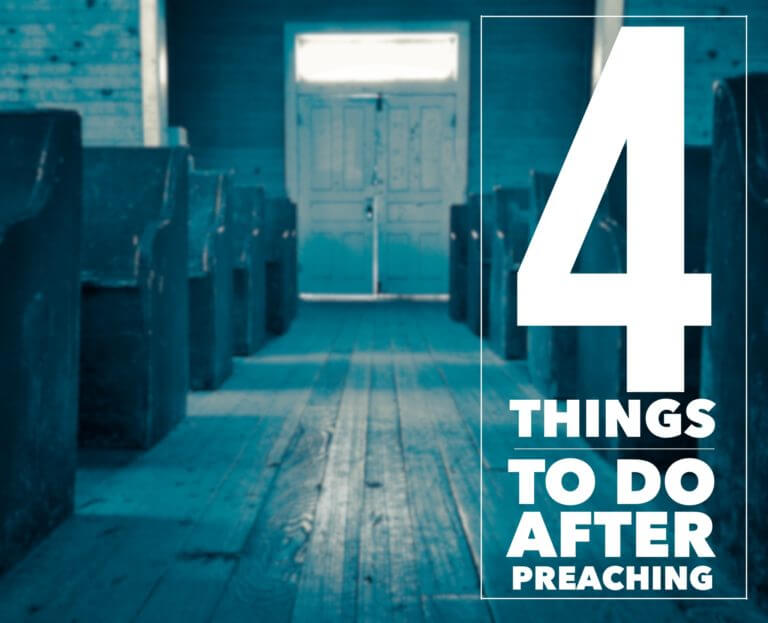12 Spiritual Disciplines That Will Make Your Faith Strong

Every athlete must train to win. Nobody can sit on the couch eating Cheetos for months and hope to compete.
The best athletes are intensely disciplined. They follow strict diet and exercise regiments to beat their body into peak physical condition, so when the game is on the line, they are ready.
We know this is true for our physical condition, but there’s a disconnect with how we think about our spiritual condition.
The sad reality is that many Christians are unfit because they are undisciplined.
Nobody drifts into discipline. Just as the undisciplined body becomes sluggish and fat, the undisciplined spirit becomes weak.
This is why Paul coaches Timothy: “train yourself for godliness; for while bodily training is of some value, godliness is of value in every way, as it holds promise for the present life and also for the life to come” (1 Tim 4:7-8).
This verse is the cornerstone of the spiritual disciplines because it spells out their purpose—training for godliness.
What Are The Spiritual Disciplines?
There is no consensus list of spiritual disciplines. The Bible does not include a set list. So different authors list different disciplines—some more biblical than others.
I believe twelve primary spiritual activities were practiced by Jesus and prescribed for all believers in the Bible: study, prayer, fasting, confession, worship, fellowship, rest, celebration, service, generosity, chastity, and disciple-making.
1. Study
All Scripture is breathed out by God and profitable for teaching, for reproof, for correction, and for training in righteousness (2 Timothy 3:16)
Of all the disciplines, none may be more important than the study of God’s Word.
Only through the instruction of the Bible can we understand the ways and the will of God. The theology and practice of every spiritual discipline is rooted in Scripture. Without the study of God’s Word, we cannot hope to grow spiritually.
Jesus knew Scripture better than anyone. As a boy, he amazed the teachers in the Jerusalem temple with his understanding (Luke 2:46-47). He quoted Scripture from memory when tempted in the wilderness (Luke 4:1-13). And he regularly quoted it in his teaching (e.g., Matthew 5:21; Mark 10:5-9). He even began his ministry with a public reading from the book of Isaiah (Luke 4:16-21). Jesus embodies the Word (John 1:14).
Today the discipline of study may have many forms:
- We can read the Bible in a physical book, on a digital device, or by listening to an audio Bible.
- We can listen to the Bible taught in our church on Sunday mornings, or online any time.
- We can also meditate. But we must make a crucial distinction here because meditation can be misunderstood. Eastern meditation focuses on emptying the mind; Christian meditation focuses on filling the mind with God’s Word. For example, Psalm 119:97 says, “Oh how I love your law! It is my meditation all the day.”
2. Prayer
“Let us then with confidence draw near to the throne of grace, that we may receive mercy and find grace to help in time of need” (Hebrews 4:16).
Prayer is how we talk to God. When we pray, God listens.
Jesus taught many things about prayer. He warned against the prayers of hypocrites who make a show of their prayer, and taught us to pray humbly (Matt 6:5-6). God is like a good father who delights in giving good gifts to his asking children (Luke 11:9-13). We should persevere in prayer until the Lord answers (Luke 18:1-8), but we must have faith for our prayers to be effective (Matt 21:22).
Jesus also modeled prayer for us in his actions. He frequently sought to get away from the crowds to pray in solitude and silence (Matt 14:23; Luke 5:16, 6:12, Mark 1:35).
Today, like Jesus, we should withdraw regularly for time alone with God in prayer. And whenever we gather with fellow believers, we should pray for one another.
3. Fasting
Their god is their belly, and they glory in their shame, with minds set on earthly things. (Philippians 3:19).
Fasting is abstaining from eating food for spiritual reasons. It is a focused time of spiritual dependence on God to sustain you, almost always accompanied by prayer.
But in our self-indulgent culture lacking in self-control, fasting may be the most neglected discipline today.
Jesus fasted (Matt 4:2-4), and he expected that his followers would fast (Matt 6:16-18).
When asked why his disciples were not fasting, Jesus said that they would not fast as long as he was with them, but “The days will come when the bridegroom is taken away from them, and then they will fast in those days.” (Luke 5:35).
Those days are today as we await Christ’s return.
Since there is no direct command exactly how to fast in Scripture, we are free to fast as the Holy Spirit leads us. However, the normal practice in the Bible is abstaining from all food.
How long should we fast? Some people fasted for one day (Judges 20:26), one night (Daniel 6:18-24), three days (Acts 9:9), seven days (2 Sam 12:16-23), fourteen days (Acts 27:33-34), and forty days (Deuteronomy 9:9). So the length can vary.
Fasting gives greater power and emphasis to our prayers and confessions as we depend on God.
Fasting is feasting on God, hungering for him alone.
4. Confession
Whoever conceals his transgressions will not prosper, but he who confesses and forsakes them will obtain mercy (Proverbs 28:13).
Confession is an admission of sin followed by repentance.
Confession can be either private (between you and God), personal (between you and a trusted believer), or public (between you and everyone).
But while we are more open to private confession, many are terrified at the thought of personal or public confession.
Of all the spiritual disciplines, confession is the only one that Jesus did not practice. Since Jesus never sinned, he had no need to confess (Heb 4:15). However, Jesus is a critical part of confession, because without his atoning death and resurrection on the cross, we would not be able to receive God’s forgiveness.
Because of Jesus, the Bible says, “If we confess our sins, he is faithful and just to forgive us our sins and to cleanse us from all unrighteousness.” (1 John 1:9).
Today, private confession is taught in most churches, but we rarely hear personal and public confession instructed.
While confessing our sins to God is of utmost importance, we may want to find a trusted believer to confess to for both support and accountability.
5. Worship
Ascribe to the Lord the glory due his name; bring an offering and come before him! Worship the Lord in the splendor of holiness (1 Chronicles 16:29).
In many churches, we have made the word worship synonymous with singing, but it is much more than that.
The English word worship comes from the Saxon word weorthscype that evolved into worthship. So when we speak of worshipping God, we mean responding according to his worthiness.
The discipline of worship is a focused response to God’s infinite worth.
Jesus is both the object and the example of our worship. When Satan tempted Jesus to worship him, Christ replied, “Be gone, Satan! For it is written, ‘You shall worship the Lord your God and him only shall you serve’” (Matt 4:10).
But we are also right to follow the example of the disciples who, upon seeing the resurrected Jesus, “worshiped him” (Matt 28:17).
In his humanity, Jesus is our example of how to worship. In his divinity, he is the object of our worship (Phil 2:6).
Whether gathered together at church or alone in our rooms, when we think about the greatness of God, we cannot help but worship him.
6. Fellowship
They devoted themselves to the apostles’ teaching and to fellowship, to the breaking of bread and to prayer. (Acts 2:42)
We tend to think of fellowship as a social activity, but it’s more than just small talk.
Fellowship is about being united as a body of believers, encouraging one another to follow Jesus.
Jesus lived in constant fellowship with the Father, and also with his disciples. But Jesus knew that fellowship would be challenging.
Before he was arrested and crucified, Jesus prayed for all believers “that they may all be one, just as you, Father, are in me, and I in you, that they also may be in us, so that the world may believe that you have sent me” (John 17:21).
But fellowship doesn’t happen by accident. So the writer of Hebrews says, “let us consider how to stir up one another to love and good works, not neglecting to meet together, as is the habit of some, but encouraging one another” (10:24-25). Regular gatherings for fellowship require discipline.
Together the embers of a fire glow red-hot. But scattered, they soon grow cold. That is why the discipline of fellowship is so important.
We all need brothers and sisters united in Christ to strengthen our faith.
7. Rest
Come to me, all who labor and are heavy laden, and I will give you rest (Matthew 11:28).
Today, the spiritual discipline of rest requires more discipline than ever.
Modern technology has made us always accessible. We are rarely disconnected from the internet, and can binge on endless entertainment options.
We suffer from busyness, yet most spiritual discipline books do not include rest.
God instituted the discipline of rest in the creation of the world. He created everything in six days, and rested on the seventh (Gen 2:3). So God instituted the Sabbath, a weekly day of rest (Lev 23:3).
The Bible warns against overworking and not sleeping because sleep is a gift from God (Ps 127:2). He created us to need rest. Plus, the act of sleeping requires trust that God will protect us while we are unconscious (Psalm 4:8).
But rest is not God’s desire for us in every moment. We must maintain a balance of when to work and when to rest (Prov 10:5). God only commanded us to rest one day a week. The other six days we were made for hard work. So Proverbs warns against laziness (6:9-11).
Jesus continued to observe the Sabbath, although he challenged cultural legalism. He went to the synagogue on the Sabbath to worship and teach (Mark 6:2, Luke 4:6).
When he was accused of working on the Sabbath when he healed people, Jesus responded, “is it lawful on the Sabbath to do good or to do harm, to save life or to destroy it?” (Luke 6:9). Healing and helping people is not breaking the Sabbath.
Rest is a spiritual discipline that we ought to practice at least one day a week. We were designed to work hard and rest well. Therefore, while Christians should work harder than anyone six days a week, we must discipline ourselves to get a healthy amount of sleep and to set a weekly day to rest.
8. Celebration
Rejoice in the Lord always; again I will say, rejoice (Philippians 4:4).
In celebration, we rejoice in God’s many blessings and remember his faithfulness.
While too much celebrating could become excessive, no celebration is also bad. Ecclesiastes 5:18-19 says that it is “good and fitting” to eat and drink and enjoy the fruit of our labor and the money and possessions that God has given us, because “this is the gift of God.”
Balance is required: “For everything there is a season, and a time for every matter under heaven… a time to weep, and a time to laugh; a time to mourn, and a time to dance” (Eccl 3:1, 4).
Jesus modeled celebration for us. His first miracle was turning water into wine at a wedding, endorsing the celebration and allowing the party to continue (John 2:9-11).
Jesus was also accused of being a glutton and drunkard because he ate and drank with tax collectors and sinners (Matt 11:19). It’s hard to believe that these were not joyous meals because people seemed to enjoy being in Christ’s company.
The key thing to remember in celebration is: “whether you eat or drink, or whatever you do, do all to the glory of God” (1 Cor 10:31). Celebration can erode into gluttony, drunkenness, and a worship of sensual pleasures when it is separated from the purpose of bringing glory to God.
This fine line may be the reason celebration has been so misunderstood by many Christians.
Today, while we must guard against gluttony and drunkenness, we are right to celebrate weddings, baptisms, holidays, birthdays, promotions, raises, anniversaries, and other family and community gatherings.
But what makes participation in all of these celebrations a spiritual discipline is remembering that we are rejoicing in God’s good gifts.
9. Service
Whatever you do, work heartily, as for the Lord and not for men, knowing that from the Lord you will receive the inheritance as your reward. You are serving the Lord Christ (Colossians 3:23-24).
The discipline of service is a direct assault on our pride. Service requires humility. We humble ourselves before God, and take on the posture of a servant, putting God and others ahead of ourselves.
There is no greater example of a servant than Jesus. He taught that the greatest people are those who serve (Matt 23:11), that the last will be first (Mark 9:35), and that even he “came not to be served but to serve, and to give his life as a ransom for many” (Mark 10:45).
Jesus modeled the humility and posture of a servant by washing his disciple’s feet and saying, “I have given you an example, that you also should do just as I have done to you” (John 13:15).
God gives every believer different gifts for the purpose of serving one another. (1 Pet 4:10).
So we can practice the discipline of service in a myriad of ways, using whatever abilities God has given us.
10. Generosity
It is more blessed to give than to receive (Acts 20:35).
Generosity is about more than just giving. It’s changing the way you think about and manage your resources.
Proverbs says, “One gives freely, yet grows all the richer; another withholds what he should give, and only suffers want,” (11:24). Ecclesiastes warns against the love of money because it will never satisfy (Eccl 5:10). But the reason we should be generous is that nothing we own really belongs to us.
Everything we have belongs to God (Ps 24:1). We are just managing God’s resources.
Jesus taught about money and possessions a lot. He warned, “Take care, and be on your guard against all covetousness, for one’s life does not consist in the abundance of his possessions” (Luke 12:15). Instead, we should store our treasures in heaven, because our hearts follow our treasure (Matt 6:19-21). If we are not careful, the cares of the world and riches will creep into our lives and keep us from God. So Jesus asks, “what will it profit a man if he gains the whole world and forfeits his soul?” (Matt 16:26). Put simply, “You cannot serve God and money” (Matt 6:24).
The problem is not the riches; it’s our attitude towards money. We need to learn to be content no matter how much money we have (1 Tim 6:6). So Paul teaches the rich to “be rich in good works, to be generous and ready to share” (1 Tim 6:17-18). Plus, giving must be done with the right attitude, because “God loves a cheerful giver” (2 Cor 9:7).
While most Americans today spend more than they make, those who practice generosity must discipline themselves to live with less. This frees more of our time, money, and possessions to be given back to God.
11. Chastity
Flee from sexual immorality (1 Corinthians 6:18).
Chastity is a discipline because all of our natural inclinations draw us towards sexual immorality. We must be disciplined to flee it and pursue pure thoughts and actions.
Chastity does not mean celibacy, although celibacy is a calling for some. It means freely enjoying God’s good gift of sex within the bounds of marriage, as God created it to be (1 Cor 7:1-5). But unless we are married, chastity requires abstinence (Acts 15:20).
The Bible’s teaching on chastity can be summed up in the seventh commandment: “You shall not commit adultery” (Exod 20:14). But Jesus takes the commandment a step further.
He says, “But I say to you that everyone who looks at a woman with lustful intent has already committed adultery with her in his heart” (Matt 5:28). So not only does chastity include not committing the physical act of adultery, but it is also about resisting the underlying root of lust.
“If your right eye causes you to sin, tear it out and throw it away,” Jesus continues. “For it is better that you lose one of your members than that your whole body be thrown into hell” (Matt 5:29). While I doubt Jesus was asking those listening to literally excavate their eyeballs, he intended this point to be strong. It is better to be blind than to burn.
For most of us then, the discipline of chastity means following Job’s example: “I made a covenant with my eyes not to look lustfully at a young woman” (Job 31:1 NIV). We must discipline our eyes not to lust after anyone who is not our spouse.
And if we are ever in a compromising situation, we should follow Joseph’s example when Potiphar’s wife tried to seduce him. Genesis 39:12 says, “she caught him by his garment, saying, ‘Lie with me.’ But he left his garment in her hand and fled.”
Through the spiritual discipline of chastity, we follow Paul’s command to put our sexual immorality and evil desires to death (Col 3:5).
And when we feel like the temptation is too strong to fight, we must remember the Bible’s promise: “No temptation has overtaken you that is not common to man. God is faithful, and he will not let you be tempted beyond your ability, but with the temptation he will also provide the way of escape” (1 Cor 10:13).
The discipline of chastity is a lifelong battle of fleeing temptation, pursuing purity, and trusting God to provide the way.
12. Disciple-Making
Go therefore and make disciples of all nations (Matthew 28:19).
Disciple-making is a spiritual discipline because it does not happen by accident.
To make disciples, as the Bible commands, we must actively seek out opportunities to share the gospel (Mark 16:15), baptize new believers, and teach them how to obey everything that Jesus commanded (Matt 28:19-20).
If our goal is to become more like Christ, then we ought to participate in his mission. Jesus said that he came “to seek and to save the lost” (Luke 19:10). When Jesus recruited the disciples, he said, “Follow me, and I will make you fishers of men” (Matt 4:19). And after his death and resurrection, he commissioned us to “make disciples of all nations” (Matt 28:19).
Disciple-making is a cornerstone of the church. In Acts 5:42, we read, “every day, in the temple and from house to house, they did not cease teaching and preaching that the Christ is Jesus.” Sharing the gospel and teaching others how to follow Jesus was a daily discipline.
All Christians should practice disciple-making. Sadly, many leave it to just the hired professionals.
Most of us don’t make disciples because we don’t discipline ourselves to do it.
This is an update of an article originally published May 1, 2018







Thank you for this work. I have always questioned what Jesus meant when he said that he came to give us abundant life. Well, these spiritual disciplines, I’m sure, are included in it.
Very good article
Thank you!
This is educative, thanks
Great Read! Thans!
Thank you for the great insight.
Thanks for the great insight.
Awesome article, it opened my eyes in so many ways. How crucial it is to study the Word of God.
This is amazing, good teaching!
That was great teaching on Spiritual Disciplines. A powerful foundation for all believers who are looking for the true path to walk in the steps of Christ. Thanks for sharing these amazing scriptures with us.
thanks for helping me to realize that the scriptures can offer us guideline to help us to discipline ourselves to becomes a better person while living this life.
I enjoyed the reading of the 12 disciplines, I think the order of the disciplines were good. I believe it is true we tend forget about fasting, I like when you wrote about the hypocrite. The reading was informative and encouraging.
Thank you,
Thank you so much for all the explanations on spiritual discipline. I am blessed and I am passing on the message to believers around.
God bless you abundantly. I really appreciate you for the list of the discipline we should have as a Christians and the explanation with scriptures. God bless you!
I hope there are more bible lessons you have. Please 🙏 share with me.
Just what I was looking for!
I enjoyed the reading of the 12 disciplines, and I like the order they were in. Defining the disciplines was real informative, and encouraging. As stated in the reading fasting is one that is rarely practiced. The prayers of the hypocrite I also found interesting.
Excellent reading,
Thank you, Linda
God bless you for this article. It really open my understanding. God bless you and give you more grace.
Thank you, this is just what I was looking for as I went to study and have expounded the Spiritual Disciplines for Christ Followers.
Good afternoon Brandon (UK time) I desire to express thanks, praise and gratitude to God for you and the way you have expounded on these (12) key and foundational principles.
God bless you abundantly and richly than you can ever imagined!
I am appreciative, of such ministry platforms (as yours) that teach, nurture, build and strengthen faith, especially in this climate, time and culture of let’s do it any/or our way’ kind of Christianity! We need to get back to biblical basics and make disciples – the way Jesus intended it to be! Thank you again!
Thank you!, Brandon. This is just what I’ve been looking for. Just recently the Lord has put on my heart the study of Spiritual Disciplines as part of self examination for the new year. Your list of disciplines and scriptural explanation of each one has been so helpful. I have been at other sites but yours has blessed me the most. I pray there be a renewed interest in the study of this means of spiritual growth. May the Lord keep His good hand up on you, be with you, go before you and grant you great favor!
Great reminders!
Thanks.
Beautiful and biblically sound article.Sir, God bless you richly.
Thanks Abigail.